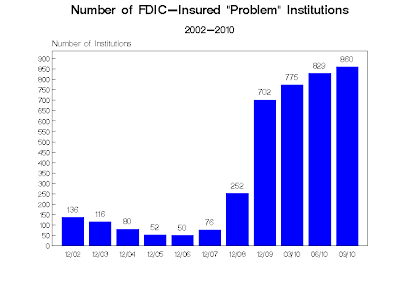 In an earlier post I mentioned how China may end up owning Alaskan oil. In the January 21, 2011 edition of the Wall Street Journal there are two interesting articles reporting that--
In an earlier post I mentioned how China may end up owning Alaskan oil. In the January 21, 2011 edition of the Wall Street Journal there are two interesting articles reporting that--Industrial & Commercial Bank of China Ltd. on Friday signed an agreement here to acquire a majority stake in Bank of East Asia Ltd.'s U.S. subsidiary, becoming the first state-owned Chinese bank to make an acquisition of a U.S. deposit-taking institution.
And...
Industrial & Commercial Bank of China is becoming the first state-owned Chinese bank to buy a U.S. retail bank. That means Americans could soon see a wave of Chinese financial institutions on U.S. shores (assuming regulators allow the deal to go through).
http://blogs.wsj.com/deals/2011/01/21/why-chinas-icbc-bank-deal-is-important/
Now, imagine the future “bailout” of a failing US bank: The US bank becomes insolvent and is taken over by the Chinese bank. (Remember when giant Washington Mutual was taken over by Chase. Chase stepped up because it was big had lots of money. The Chinese bank could become as big or even bigger than Chase).
 The US has not seen the last of failing banks:
The US has not seen the last of failing banks:There were 157 bank failures in 2010, the highest since 1992 and next year is expected to be worse.
According to Bill Zielinski in a post on “Problem Bank List”:
 Banking failures for 2010 were at the highest level since 1992 as 157 financial institutions collapsed, the victims of collapsing real estate prices, a weak economy and poor lending decisions. There are many reasons why 2011 could see another wave of banking failures:
Banking failures for 2010 were at the highest level since 1992 as 157 financial institutions collapsed, the victims of collapsing real estate prices, a weak economy and poor lending decisions. There are many reasons why 2011 could see another wave of banking failures:1- Unemployment remains stubbornly high and economic recovery remains subdued.
2- Approximately 25% of homeowners with a mortgage are now underwater and negative equity is a major contributing factor to mortgage default. If prices continue to decline expect another wave of foreclosures resulting in major losses to bank loan portfolios.
3- Home purchases are expected to decline as banks maintain vigorous underwriting standards and buyers wait for prices to stabilize. Banks will also remain conservative due to the risk of recourse losses on loans sold to Fannie Mae and Freddie Mac.
4- Bank balance sheets already hold assets at values in excess of fair market. A further drop in real estate values will further increase losses for both failed and surviving banks.
http://problembanklist.com/bank-failures-in-highest-since-why-next-year-will-be-worse-0272/
Imagine receiving a notice from your local bank that it is now a China-government-owned bank, and that your deposits and loans are held by it. It’s not too far-fetched to see how a Chinese bank could end up holding the mortgage or deed of trust on your home through a simple transfer of documents. Delinquency and default could result in the Chinese bank (i.e., Chinese government) owning residential real estate in the US.
Banking regulations and practices could also change. Requests for new commercial and consumer loans would have to be approved by the new bank. A current complaint is that banks now have money to lend, but simply won’t loan it. The new bank owners could change many things about commercial and private life in America, literally deciding when, to whom and for what to loan money.
It’s interesting but sad to watch as America is gradually indebting itself and its future generations to a foreign government. This really does put our children’s future in the control of others. China’s policies and practices may become our policies and practices. Excessive spending, borrrowing and debt do that.
How will “the people” now complaining about domination and exploitation by “greedy American corporations” react when the US corporations are gone and even more interest payments are sent to China to benefit Chinese stockholders (i.e., the Chinese government)? Will future generations of Americans be able to some day borrow money from the "local" bank to buy their first home?





My son told me you can buy a house in China, but you get a 70 year lease on the land. You can transfer title, but when the 70 years is up, the goverment takes all. I said, "So you don't really own your house." To which he replied, "Do you? What happens if you don't pay your property tax?"
ReplyDelete